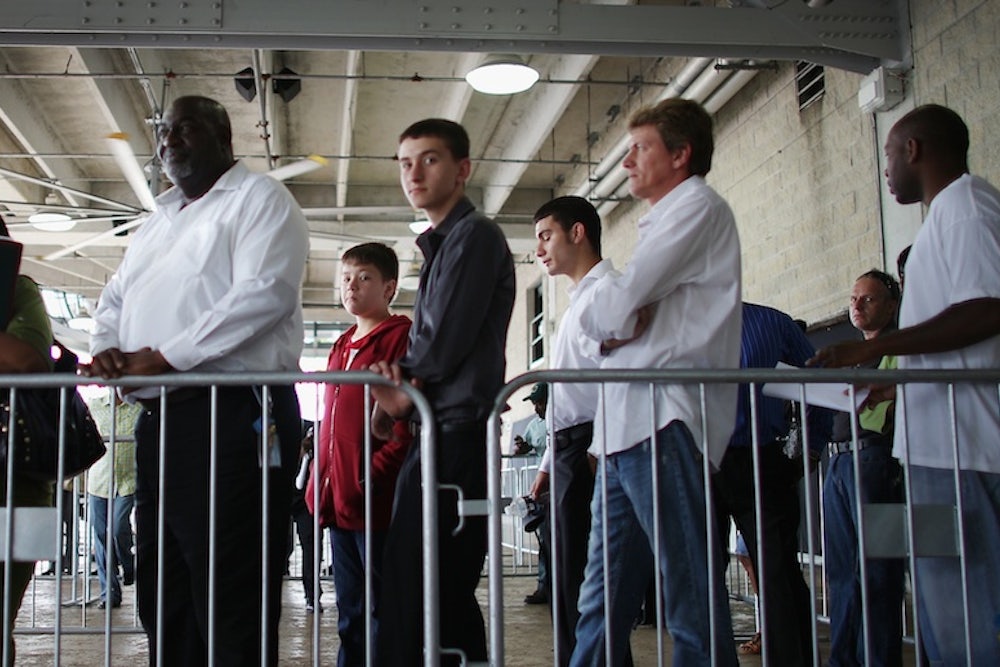On Tuesday, the Congressional Budget Office delivered a mixed verdict on Democrats' proposal to increase the federal minimum wage to $10.10: The hike would raise wages for 16 million people, lift 900,000 people out of poverty, and kill 500,000 jobs. But what if there were a way to improve Americans' incomes without any job loss? In fact, there is.
It’s called full employment. And if the CBO is right that hundreds of thousands of Americans would lose their jobs due to a minimum-wage hike, then getting the economy back to full employment is even more important.
“You want those people to be rehired as soon as possible, because remember, when they get their next low-wage job, it’s a better low wage job,” said Jared Bernstein, a senior fellow at the Center for Budget and Policy Priorities and the former chief economist to Vice President Joe Biden. “You want to achieve as tight a labor market as you can, because the benefits of a tight job market flow down most emphatically to those at the low-end.” (Bernstein supports the president's plan to raise the minimum-wage.)
So, what are some ideas for moving the economy back toward full employment? Bernstein and Dean Baker, the co-director of the Center for Economic Policy Research, have a few ideas. They released a free e-book a few months ago that proposed the following:
1. Direct government job creation. Bernstein points to the TANF Emergency Fund, which helped put more than 260,000 people in temporary jobs during the recovery. Just as the Fed acted as a lender of last resort during the financial crisis, the government could take on the role of employer of last resort now.
2. Reducing the trade deficit. Bernstein and Baker argue that we’ve taken aim at the wrong deficit the past few years. Instead, we should be focusing on reducing the trade deficit by installing tariffs against currency manipulators or taxing foreign holdings of U.S. Treasuries. This would increase demand for U.S. goods and spur stronger economic growth.
3. Work-sharing. These are laws that allow companies to cut their workers’ hours by a certain amount instead of laying off a portion of the workforce. For instance, instead of firing 20 percent of their employees, an employer would cut everyone’s hours by 20 percent. Congress passed a work-sharing law in 2012 that allows workers who lose hours from work-sharing to collect a portion of unemployment benefits. Bernstein and Baker want to make the policy better known so more employers take advantage of it.
4. Fiscal and monetary policy. Bernstein is critical of the Fed’s taper, believing it is coming too soon. He and Baker also propose further infrastructure investment along with eliminating the sequester.
The above ideas are all left-leaning. What does the other side say? The Republican Party does not have much in terms of a jobs plan, but different reform conservatives have ideas that are more promising. In National Affairs, Michael Strain proposed two ideas to help the long term unemployed. (Like Bernstein and Baker, Strain also supports work-sharing.) Short-term unemployment in the U.S. economy has almost returned to pre-recession levels. The current slack in the labor market is mainly made up of the long-term unemployed. Strain wants to attack that problem head on:
1. Relocation Subsidies. These would allow low-income Americans to move to areas of lower unemployment where they will have better opportunities to find jobs. Moving is often expensive, so Strain proposes having the government help out with the costs. Republican Senator John Thune has recently hinted at a similar plan to offer low-interest loans for the unemployed to move to areas of low unemployment.
2. Lower minimum wage. Strain also wants to allow companies to pay long-term unemployed workers a lower minimum wage ($4, to be exact). The government would give them a wage subsidy so they can maintain a decent standard of living. This would make it more cost-effective for employers to hire the long-term unemployed. Other reform conservatives such as Ramesh Ponnuru and Jim Pethokoukis have been strong advocates of monetary stimulus and having the Federal Reserve do more to return the economy to full employment.
Unfortunately, Congress (mostly congressional Republicans) has shown little interest in passing any legislation intended to boost employment. Full employment will raise wages without an increase in the minimum wage while also making it easier for those workers displaced by a minimum wage hike to find work again. That’s something both parties can support.
